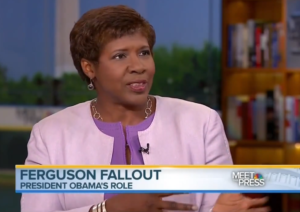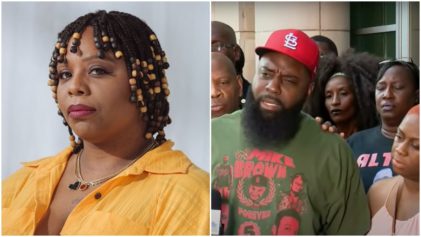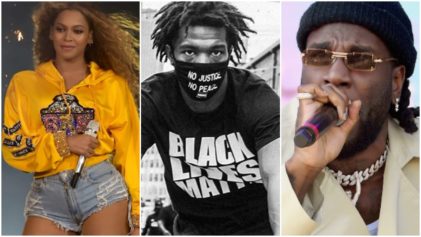
Ifill, who is the managing editor of Washington Week and co-managing editor of PBS NewsHour, made her observations to America’s reaction to the Ferguson demonstrations on NBC’s Meet the Press.
Since the death of Michael Brown, the unarmed 18-year-old who was fatally shot by Ferguson police officer Darren Wilson, protests have swept across the nation and the city of Ferguson has been in a state of unrest.
Celebrities have spoken out about the tragedy of yet another African-American man’s senseless death and social media has been ablaze with discussions about the deeper implications of Brown’s death and race relations in America.
It has been a powerful movement and according to Ifill, it’s reminiscent of the 1960s.
“But there’s something else that’s been exposed here which no president, no attorney general can get to, which is that there’s this bruise that we keep poking at in this country about race,” Ifill said. “We don’t know how to deal with it unless there’s a flare-up.”
She said that matters of race are a recurring theme in America and the push for justice appears to fall short most of the time.
This time, however, Ifill believes the situation is drastically different.
“There’s a new Civil Rights Movement which has sprung up,” she said. “We’ve been looking back 50 years for the last couple of months, the 50-year signings of bills and laws. These young people on the streets, these young people who’ve created a social media movement around Michael Brown, they’re not saying, ‘Pass a law.’ They’re saying, ‘Enforce the current ones.’ They’re not saying, ‘We’re going to wait for a single, singular leader to tell us which way to go.’ They’re saying, ‘We’re going to lead ourselves.’”
Those sentiments, Ifill explains, are what makes this movement different.
“And there is something which we can’t miss in what feels different to me than Trayvon Martin, it feels different to me than Rodney King,” she said. “These are all situations in which justice was questioned. But it feels to me like Americans, not just African-Americans, are picking themselves up and saying – the first pictures we saw out of Ferguson, the common response was, ‘Is that America?’ And I think people are saying, ‘Let’s address that. Let’s address ourselves, not expect some person to figure it out.’ ”
After Brown was shot and killed in Ferguson, and images of the massive police force response hit the media, there was outrage on a national scale.
Major cities including Los Angeles, Chicago, Atlanta and New York City held protests to stand in solidarity with Brown’s family and the people of Ferguson.


